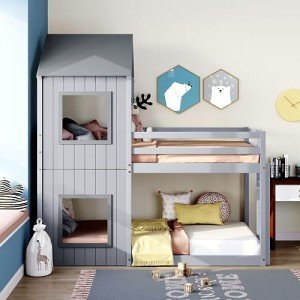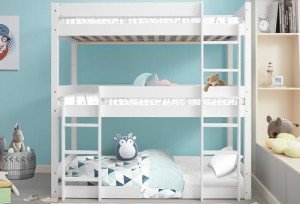Bunk Beds Sale: A Comprehensive Guide to Choosing the Right Bunk Bed for Your Home
Bunk beds have long been a staple in children's bedrooms, offering a mix of space-saving efficiency and fun. Whether accommodating brother or sisters, good friends on sleepovers, or just making the most of a playroom, bunk beds have become an important element in modern household homes. As sales on bunk beds rise, it ends up being significantly crucial for consumers to make educated decisions when buying one. This short article will cover the basics of purchasing a bunk bed, from types to safety functions, as well as pointers for keeping the stability of your financial investment.

Types of Bunk Beds
When considering a bunk bed sale, it's important to comprehend the various designs available on the market. Below are the most typical types:
Traditional Bunk Beds Beds Beds: These include two beds stacked one above the other, sharing a single frame. They are often the most cost-effective option.
L-Shaped bunk bed uk Beds: This design includes one bed placed vertically and another horizontally. This arrangement creates extra space underneath the upper bed, which can be utilized for storage or a backyard.
Lofted Beds: Similar to traditional bunk beds however without any lower bed. Rather, the space beneath can be used for a desk, play area, or additional storage.
Triple Bunk Beds: For families with a larger number of children or frequent sleepovers, triple bunk beds provide 3 sleeping areas in a space-efficient design.
Futon Bunk Beds: These styles combine bunk beds and futon sofas. The bottom area transforms into a different seating area, boosting performance.
Convertible Bunk Beds: These beds can be separated into two specific beds, making them versatile as children's needs alter with time.
Table 1: Comparison of Bunk Bed Types
| Type | Description | Space Efficiency | Extra Features |
|---|---|---|---|
| Standard Bunk Bed | 2 beds stacked vertically | High | Easiest style |
| L-Shaped Bunk Bed | One vertical and one horizontal bed | Moderate | Play or storage space |
| Lofted Bed | Raised bed with open space below | High | Work/play area |
| Triple Bunk Bed | 3 stacked beds | Really High | Accommodates more users |
| Futon Bunk Bed | Bunk bed with a convertible futon | High | Multi-functional |
| Convertible Bunk Bed | Can be split into two separate beds | Moderate | Flexibility & & longevity |
Safety Features to Consider
Safety is critical when investing in a bunk bed. Below are crucial safety features to try to find:
Guardrails: Adequate guardrails should be present on both sides of the upper bunk to avoid falls. They need to be at least 5 inches higher than the bed mattress.
Ladder Design: Look for sturdy, large ladders with slip-resistant rungs. Make sure that the angle is not too high for simple access.
Stability: Ensure the bed is built with strong products, such as solid wood or heavy-duty metal. The bed must not wobble when in usage.
Weight Limit: Check the weight capability of the bunk bed to ensure it can accommodate the designated users securely.
Product Safety: If possible, choose beds made from non-toxic products or those fulfilling security standards for kids's furniture.
Table 2: Essential Safety Features
| Feature | Description | Value |
|---|---|---|
| Guardrails | Sides of upper bed to avoid falls | Vital for child safety |
| Ladder Design | Solid, slip-resistant rungs | Aids safe and easy gain access to |
| Stability | Develop quality to prevent wobbling | Ensures safety and longevity |
| Weight Limit | Optimum weight capacity | Avoids accidents |
| Product Safety | Non-toxic, safe products | Protects kids's health |
Upkeep Tips for Bunk Beds
To extend the life of your bunk bed and guarantee ongoing security, consider the following maintenance pointers:
Regular Inspections: Periodically examine the structure for loose screws, bolts, or any signs of wear. Tighten up fasteners as necessary.
Clean Periodically: Dust and clean the surface areas frequently. Usage appropriate cleaners that will not damage the finish.
Examine Weight Limits: Be mindful of weight limits, especially with older children or adults who may want to utilize the upper bunk bed cheap.
Avoid Climbing on Guardrails: Educate children not to use guardrails for climbing up or playing to reduce the risk of accidents.
Regularly Asked Questions (FAQs)
Q1: What is the age limitation for children to safely utilize bunk beds?A: While it varies by the manufacturer, lots of suggest that kids under 6 ought to not sleep in the upper bunk due to security issues.
Q2: How can moms and dads dissuade unsafe climbing?A: Setting clear rules about bunk bed use and supervising kids can help. In addition, utilizing a bed camping tent can prevent climbing up while producing an enjoyable sleep environment.
Q3: What should I think about when embellishing a space with bunk beds?A: Ensure there suffices space around the bunk bed for safe movement, and utilize the decoration to create individualized spaces for each child.

Q4: Is a lofted bed ideal for older children?A: Yes, lofted beds can be appropriate for older kids as long as they fulfill safety requirements and the child is responsible enough to utilize them securely.
Bunk beds serve a practical purpose while including an aspect of fun to a child's bedroom. As sales of bunk beds continue to rise, mindful factor to consider of types, safety functions, and maintenance practices is necessary for parents and caregivers. By understanding these crucial elements, families can discover the best bunk bed for their home, guaranteeing both usefulness and safety for years to come. Whether it's for brother or sisters sharing a space or developing a relaxing pajama party space, a well-chosen bunk bed can offer joy and usefulness, making it a worthwhile investment.








